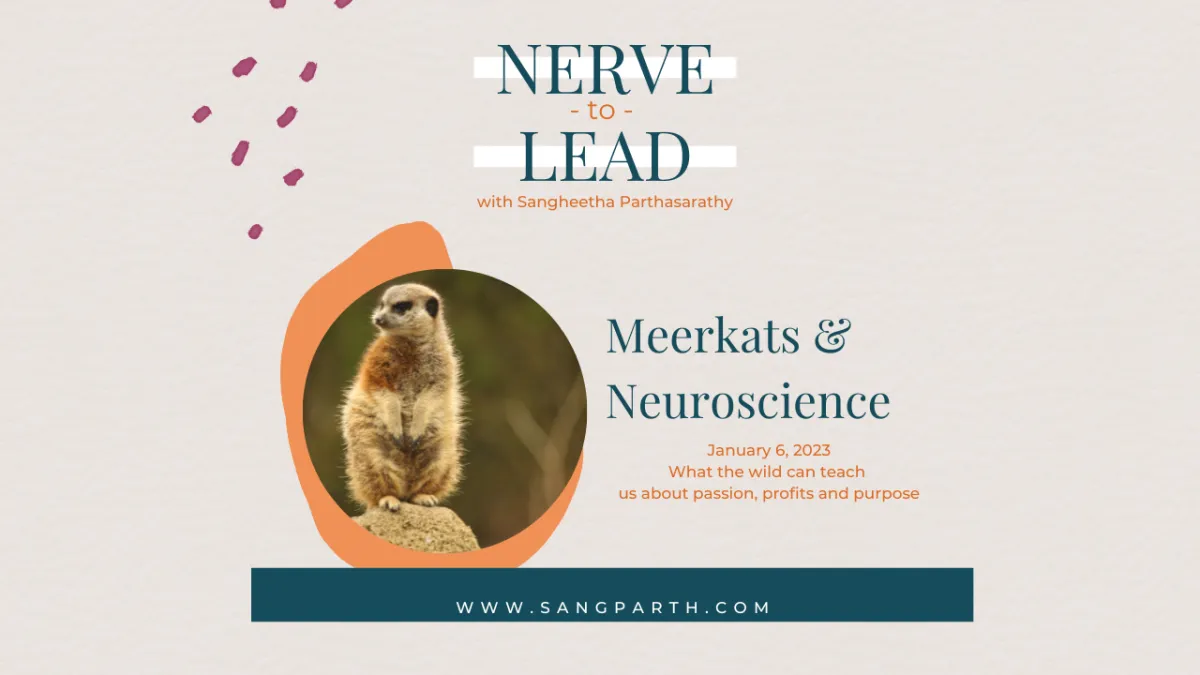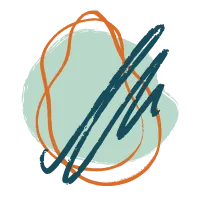
Meerkats & Neuroscience
Have you seen Meerkats in a group?
There is one meerkat, who finds its way to the top of a rock. It stands in rapt attention.
Observe its body, and you will spot the following
Ears perked up
Eyes wide open
Nostrils flared
Tightening of body
Limbs ready to attack/defend
Listening in rapt attention for any and all cues of danger.
In this state, their metabolism shuts down, breathing is shallow, and all non-essential bodily functions pause, in preparation for what may follow.
If you look around the others in the pack, having this one Meerkat do that job, is probably what allows their bodies to be relaxed, fun, and playful.
You see the young ones running about and playing, babies being cuddled by their moms, some Meerkats are eating, drinking and maybe even dozing off.
The adult Meerkats then take turns doing this, so everyone in the group can relax.
What happens to leaders, change-makers and parents in this day and age is that we become t hypervigilant Meerkats standing on top of the rock, looking out for ourselves as well as for the entire pack, both at home and at work.
And sometimes taking turns is not an option.
Some other times, we find it hard to trust others to be on that rock for us.
So this "standing on the rock" physiology becomes the default setting, and even after we have gotten off that metaphorical rock, our bodies are stiff, constricted, ears perked up, eyes wide open, ready to react, ready to protect/defend/attack.

The thing about this hypervigilant state - is that we are not biologically able to stay and operate from it for long periods of time.
This is like a fail-safe switch, meant to be used only in emergencies.
With overuse, the whole world can feel like a threat waiting to happen.
The switch that signals what is safety vs danger, can get broken with overuse, and then we can get stuck on "ON" for extended periods of time, where everything and everyone feels like a threat, or on "OFF" where nothing feels like a threat, and therefore we sometimes freeze, unable to mobilize against danger.
How does our "Meerkat" show up in the workplace or entrepreneurship?
we are always overprepared,
we come armed with more-than-required amounts of data to meetings
we overexplain ourselves
we develop a fake sense of self that talks, walks, and acts like a cishet white male (or whatever we think "power" looks like)
we completely shut down from our emotions to avoid being called the crazy one at work
we develop a bigger-than-life version of ourselves
and take the first shot to avoid being at the receiving end of it
we always have "one foot out the door"
updating our LinkedIn profiles and constantly feeling the need to stay in touch and build networks in case of "what-ifs"
unable to relax into all our successes and funding rounds, unable to take compliments or savor life
we tone police everything we say or write, check it over and over again before pressing "send or "Publish"
we stay "on" even after we get home costing interpersonal connections
Why must we befriend the nuanced art of getting on and off that rock when appropriate?
Look at the other meerkats that are not on that rock.

They are in their groups, eating, drinking, playing, and sleeping.
In other words, carrying out normal autonomic functioning.
In this bodily state, connection feels available.
The world feels largely safe, and pleasure becomes available, slowing down becomes possible.
Their bodies are relaxed.
Ingestion, digestion, excretion, and other metabolic functions are turned back on when the body feels safe and connected.
Immunity, emotional regulation, body's cell repair functions, all of it predicated on our defense systems being turned off.
In other words, learning when and for how long to stay on the rock, and prioritizing return to safety, is fundamental to our physical health, emotional health, gut functioning, and ultimately longevity, and long term entrepreneurial success.
In my signature nervous system regulation, I have helped hundreds of clients befriend their "Meerkat" self, so that they are able to switch between connection and protection when needed through evidence-based neuroscience.
My team and I have a total of 40+ years of experience in attachment, trauma, primitive reflexes. Curious?
Book a 15 minute call and let's talk.
https://www.sangparth.com/relationships
What we offer
Our Areas Of Focus

Career, Entrepreneurship& Leadership

Sex, Relationships
& Parenthood

Eating, Movement &
Body Image

